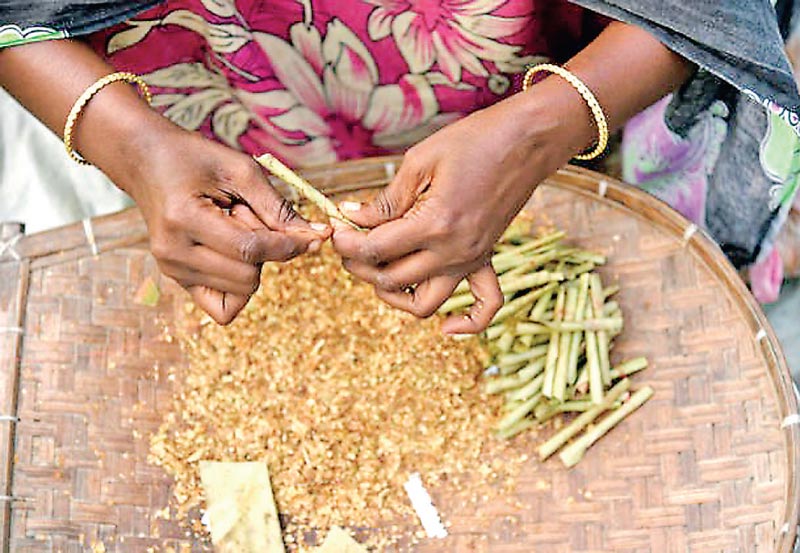Saturday Feb 28, 2026
Saturday Feb 28, 2026
Tuesday, 21 March 2023 00:47 - - {{hitsCtrl.values.hits}}

On average, six bundles of beedi were sold daily in the past, but in recent times sales have doubled – even reaching 20 bundles on a good day
By K.G. Kodithuwakku
The rise in the price of cigarettes has resulted in a significant number of smokers switching to beedi. Being engaged in the retail trade, over the past ten years we have witnessed a steady decline in the sale of cigarettes; from over ten packs a day to as low as two. Price pressure is the primary cause of this downturn where some smokers have switched to beedi. On average, six bundles of beedi were sold daily in the past, but in recent times sales have doubled – even reaching 20 bundles on a good day.
Beedis are generally seen as a ‘working class’ product and are smoked primarily by the older generation. But over the past year, beedis have drawn a new group of consumers including youth who were not previously associated with it. As cigarette prices went up, these groups switched to cheaper products, while some made the somewhat bold but economic transition to beedi.
Given its low price, beedis also present an easy access point for under-aged persons experimenting with smoke. Just like cheaper cigarettes, beedis are somewhat harsh products for consumers, but at roughly Rs. 10 a stick, they pose a significant price advantage over a standard cigarette that costs Rs. 100.
Two points of concern come to mind. In the first place, if authorities hoped to reduce smoking through price increases, this strategy appears to be failing. Whilst there is a notable drop in the sale of cigarettes, there is a marked increase in the consumption of beedi. It would be wrong to assume everyone who is no longer smoking cigarettes or less has switched to beedi. But there is a considerable increase in sales of beedi in contrast. Therefore, if authorities hope to curb smoking via price increases or other measures, they must consider imposing similar controls over beedi as well.
On the other hand, there comes the question of quality and safety. Cigarettes are marketed by the distributor appointed by the tobacco company. There are stringent processes that govern stock-taking, shelf-life, method of sale, etc., which no doubt permeates to their production process. Beedis were supplied by two traders in the past.
Over the past two years, this number has grown to six. The beedis, on the face of it, comes in various shades and shapes, and consumers have rejected a couple of brands that entered the outlets recently. One such producer did not accept his brand’s rejection lightly.
Over the years, our outlet has received numerous visits from Food and Public Health Officials, Police, and others. While cigarettes have always been a point of concern, they have barely raised an eyebrow over the sale of beedis.
This raises several concerns as both products can cause harm to health, but officials only seem concerned over the registered product and turn a blind eye on the unmarked product. They seldom raise questions on their sales, and if persons below 21 are purchasing the product.
Availability and sale of beedi is growing drastically, and what is most concerning is the number of people below legal age who are taking it up with price proving the decisive point. Beedis are considerably cheaper, as pointed out above, and this enables persons from all income groups to have constant access to smoking. A bundle of 20 beedis is Rs. 200; less than the price of two cigarettes. It is imperative that authorities treat all tobacco products in the same vein in the interest of our people’s health.